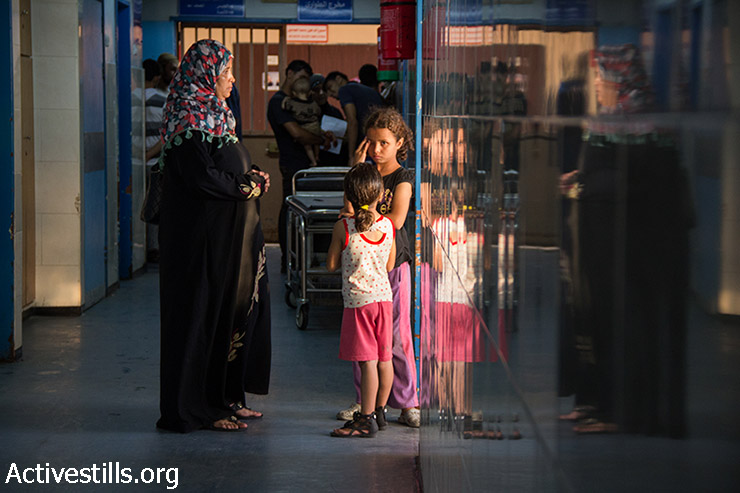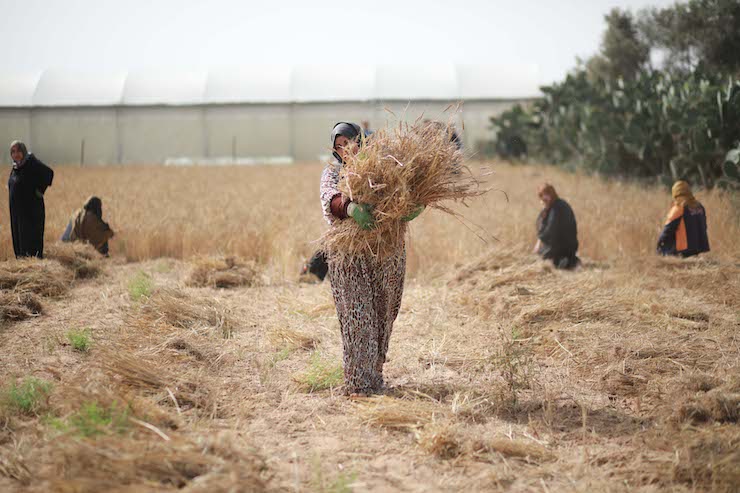Women in Gaza deal with patriarchal gender norms and intra-Palestinian political divides, but addressing their needs cannot be realized without Israel lifting its blockade.
By Anwar Mhajne

Violence during military operations affects both men and women, but women often face a unique set of challenges. For Palestinian women in Gaza in particular, the interaction between patriarchy, the intra-Palestinian political divide, and Israel’s blockade, exacerbates the violence they face.
Internal political divisions hinder the establishment of effective institutional response mechanisms across the occupied Palestinian territories. Patriarchal gender norms and traditions contribute to the proliferation and acceptance of violence against women and girls. But Israel’s decades-long blockade of Gaza, which heavily restricts the movement of people and goods in and out of the strip, has created an environment of constant violence against women.
According to a 2011 violence survey by the Palestinian Central Bureau of Statistics (PCBS), 37 percent of women, on average, are victims of gender-based violence in Palestine. In the Gaza Strip, this figure increases to 51 percent.
The risks of experiencing gender-based violence surges in times of direct military operations. For example, during Operation Protective Edge in 2014, the danger of experiencing domestic violence increased considerably, according to research on violence against women and girls in Gaza. During the war, there was a 22 percent incline in the forms of domestic violence experienced by married women, and a 30 percent increase for non-married women. Furthermore, the displacement caused by military operations increase the likelihood of experiencing domestic violence.
The high rates of poverty and unemployment, which have caused an enduring economic depression in Gaza, have obliterated family income sources, and traditional family relationships have struggled to adjust to the changing situation. Thousands of men in Gaza are unable to fulfill their traditional role as the breadwinner and protector of the family, leaving women to bear the brunt of their husbands’ frustrations.

Even though unemployment rates are high in Gaza (52 percent), there is a significant increase in women’s workforce participation, which has now reached 26 percent. The blockade has forced hundreds of women to become the sole providers while still tending to housework and caring for their husbands, many of whom suffer from depression. Women’s integration in the workforce emerged out of necessity, but it threatens traditional masculine identities and adds further to tensions in the home.
Lengthy exposure to violence intensifies daily pressures for Palestinians, which risks exasperating gender-based violence. When violence is pervasive and sustained, family relations suffer from the conflict-related changes in gender roles and activities. Palestinian women whose husbands have been directly exposed to political violence were 47 percent more likely to report experiencing psychological intimate partner violence (IPV), 89 percent more likely to report experiencing physical IPV, and 2.2 times more likely to report experiencing sexual IPV. Displacement during military operations is associated with instances of emotional domestic violence, controlling behavior, and non-domestic violence.
Another implication of the Israeli blockade is the shift in youth’s (men and women) attitudes toward conservatism due to the absence of employment opportunities and social interaction. Young men and women reverted to religion and tradition, which regulate gender relations, as a source of social and personal safeguards. Even highly educated women and men, as well as those who are regularly employed, hold conservative attitudes about gender roles and gender equality.
Another type of violence that women experience due to the blockade is a lack of access to essential medical services. Physicians for Human Rights-Israel published a report in March detailing how Israel’s Gaza blockade exacts a higher price in health from Palestinian women than from Palestinian men. The report examined three classifications: female cancer patients traveling from Gaza to Israel for treatment, patients having treatment withheld because of kinship with Hamas members, and patients having treatment withheld on the grounds that a family member is in the West Bank without permission.
Some women were also prevented from accompanying their children to receive medical care because they are related to members of Hamas. For example, in August of last year, Israel did not permit a mother from Gaza to accompany her 3-year-old son to a hospital in the West Bank for cancer treatment because she is a first-degree relative of a Hamas member. The woman had to resort to Facebook to find an eligible, unrelated woman to accompany her son for medical treatment.
In addition to navigating economic insecurity, increases in domestic violence, and the loss family members due to the occupation, women are also being punished for the decisions and ideological stances of the men in their family. On top of the psychological impact of experiencing physical violence on a daily basis, women are exposed to emotional violence when they are banned from being present for their sick children, and thus being unable to fulfill their roles as mothers.
Women in Gaza experience tremendous challenges, restrictions, and violations to their basic human rights. Even though patriarchal norms play a role in the violence women in Gaza regularly face, the occupation and the blockade exacerbates and introduce other forms of violence. Addressing the needs of women in Gaza and achieving gender equality cannot be realized without lifting the blockade and finding a resolution to the Israeli-Palestinian conflict.
Dr. Anwar Mhajne is a Palestinian citizen of Israel. She is an Umm Al Fahem native, but moved to the United States in 2011 to pursue her M.A. and later her Ph.D. Anwar is currently a Postdoctoral Teaching Fellow in the Department of Political Science at Stonehill College, MA. Twitter: @mhajneam.
